|
|
|
Sort Order |
|
|
|
Items / Page
|
|
|
|
|
|
|
| Srl | Item |
| 1 |
ID:
133883


|
|
|
|
|
| Publication |
2014.
|
| Summary/Abstract |
Access to public health care has often been equated with health outcomes. Outcomes-based analysis often misunderstands the process of access to health. This article conceives access to health as a bundled concept and decomposes access into availability, affordability and acceptability. Access to health is determined by public provisioning as well as by socio-economic characteristics of households. It attempts to examine these dimensions across different regions of the Indian state of Uttar Pradesh (UP). It shows that there are variations across regions and socio-economic characteristics of households. A particular group from one region may not have the same degree of access as its counterpart in another region and at the same time there are variations across groups in the same region. The scale of development of regions also plays an important role in promoting or hindering access to health.
|
|
|
|
|
|
|
|
|
|
|
|
|
|
|
|
| 2 |
ID:
133884
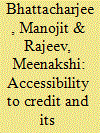

|
|
|
|
|
| Publication |
2014.
|
| Summary/Abstract |
It is well known that around 80 per cent of farmers in India are in the small or marginal farmers group which requires financial resources on a regular basis for their farming activities. Needless to say, as these households do not possess adequate savings, accessibility to financial resources at reasonable terms and conditions from financial intermediaries becomes a crucial parameter for their productive activities and hence, in turn, their well-being. Based on the 59th round of household-level data from the Debt and Investment Survey and the Situation Assessment Survey (SAS) of farmers provided by the National Sample Survey Organisation (NSSO) of India, this article examines the nature of exclusion faced by farmer households in credit markets across selected prominent states of India. This is done by constructing an indicator, namely, the 'incidence of borrowing'. This article also tries to identify the factors that explain exclusion from access to financial resources by developing a methodology for the detection of credit exclusion. Our results show that the relation between the cost of credit (interest rate) and access to credit depends heavily on the extent of prevalence of informal lenders in a region.
|
|
|
|
|
|
|
|
|
|
|
|
|
|
|
|
| 3 |
ID:
124429
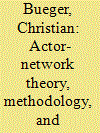

|
|
|
|
|
| Publication |
2013.
|
| Summary/Abstract |
Since its initial formulation in science and technology studies, actor-network theory (ANT) has spread like wildfire throughout the social sciences. Wildfires are fueled by dry and flammable vegetation as well as hot, gusting winds. ANT finds flammable vegetation among those frustrated with many of the conventions, dualisms, and dilemmas of the traditional social sciences. ANT promises to liberate scholars from strict dualisms such as the nature/society divide and the agency/structure dilemma. It claims to open up a reflexive discourse on what constitutes the practice of science. ANT's avant-garde spirit further fuels the fire. Others reject ANT. They (rightfully) lament the often-awkward terminology of ANT, its lack of appropriately defined models and concepts, its literary style of presentation, as well as the radical rhetoric that often comes along with it. For many, the question of what actually constitutes ANT remains mysterious, and it is often unclear whether it is more than a "new materialist" argument for taking objects, things, and technology seriously.
|
|
|
|
|
|
|
|
|
|
|
|
|
|
|
|
| 4 |
ID:
127871


|
|
|
|
|
| Publication |
2014.
|
| Summary/Abstract |
In order to meet its 2050 target of 80% carbon emissions reduction, the UK is facing a challenge of restructuring its energy system, possibly by introducing more decentralised energy (DE) systems.Following semi-structured interviews, four exemplar international cases have been critiqued in order to investigate the variety and interrelationship of the drivers and barriers involved during their implementation, and then compared with the barriers and drivers that can potentially affect the implementation of similar projects in the UK context. The impacts of the barriers on the outcomes of these projects were evaluated, and recommendations were presented on overcoming these barriers if replicating similar projects in the UK context. Governance drivers play the most significant role, whereas financial drivers (commonly believed to be crucial), are deemed to play a lesser role. Social, governance and financial barriers rather than technological barriers constitute the central problem areas for the increased adoption of DE. The drivers and barriers experienced in the international cases were similar to those anticipated in the UK. The case studies present a high potential for replication and scaling up in the UK context and demonstrate that the increased implementation of DE systems could also enhance social and governance benefits.
|
|
|
|
|
|
|
|
|
|
|
|
|
|
|
|
| 5 |
ID:
132006
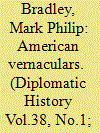

|
|
|
|
|
| Publication |
2014.
|
| Summary/Abstract |
On a wintry January evening in 1973, the members of Amnesty International USA Group 11 gathered on the Upper East Side of New York City to adopt a new prisoner of conscience, Sutanti Adit of Indonesia. Adit, a medical doctor and the wife of the leader of the Indonesian Communist Party, had been arrested and imprisoned in the ruthless campaigns of repression that followed a failed 1965 coup against the Sukarno government, which had ruled Indonesia since its formal independence from Dutch colonial control in 1950. She was among more than a hundred thousand Indonesians arrested, interrogated (often under torture), and imprisoned by the state. As many as fifty thousand of them remained in custody for more than a decade housed in prison camps whose sanitation, medical facilities, and food were inadequate at best. They were permitted very limited contact with the outside world, including family and friends, and harshly mistreated by prison guards.1
|
|
|
|
|
|
|
|
|
|
|
|
|
|
|
|
| 6 |
ID:
131521


|
|
|
|
|
| Publication |
2014.
|
| Summary/Abstract |
This article revisits the official culture of the early khedivate through a microhistory of the first modern Egyptian theater in Arabic. Based on archival research, it aims at a recalibration of recent scholarship by showing khedivial culture as a complex framework of competing patriotisms. It analyzes the discourse about theater in the Arabic press, including the journalist Muhammad Unsi's call for performances in Arabic in 1870. It shows that the realization of this idea was the theater group led by James Sanua between 1871 and 1872, which also performed ?Abd al-Fattah al-Misri's tragedy. But the troupe was not an expression of subversive nationalism, as has been claimed by scholars. My historical reconstruction and my analysis of the content of Sanua's comedies show loyalism toward the Khedive Ismail. Yet his form of contemporary satire was incompatible with elite cultural patriotism, which employed historicization as its dominant technique. This revision throws new light on a crucial moment of social change in the history of modern Egypt, when the ruler was expected to preside over the plural cultural bodies of the nation.
|
|
|
|
|
|
|
|
|
|
|
|
|
|
|
|
| 7 |
ID:
128533
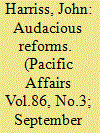

|
|
|
|
|
| Publication |
2013.
|
| Summary/Abstract |
An introduction is presented to a section of articles on the topic of India's social policies in which the author discusses the country's welfare legislation and their Land Acquisition, Rehabilitation and Resettiement Bill (LARRB).
|
|
|
|
|
|
|
|
|
|
|
|
|
|
|
|
| 8 |
ID:
125281


|
|
|
|
|
| Publication |
2013.
|
| Summary/Abstract |
Disasters are not only increasing in number, they are becoming more complex as natural and man-made crises combine to cause mega-disasters. Rapid urbanization, population growth, political unrest, and migration have created fragile environments in many countries, and boundaries are blurring between complex emergencies and chronic vulnerability in places such as the Democratic Republic of the Congo and Somalia. These factors have resulted in intense pressure on the UN's humanitarian organizations and partners to respond more quickly when disaster strikes and to be more effective in its response.
|
|
|
|
|
|
|
|
|
|
|
|
|
|
|
|
| 9 |
ID:
126047
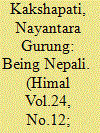

|
|
|
|
|
| Publication |
2011.
|
| Summary/Abstract |
Tharu. Chhetri. Danuwar. Gurung. Lohar. Newar. The Nepali people belong to 102 ethnicities, castes and other groups and speak 92 living languages. Amidst sweeping political changes, it has become very important to define oneself along ethnic lines, to show where loyalties lie.
|
|
|
|
|
|
|
|
|
|
|
|
|
|
|
|
| 10 |
ID:
121907
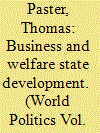

|
|
|
|
|
| Publication |
2013.
|
| Summary/Abstract |
In recent years, employer-centered explanations of welfare state development have begun to challenge conventional labor-centered and state-centered explanations. These new explanations suggest that sector-specific business interests and cross-class alliances propelled the adoption and expansion of social programs (the business interests thesis). This article presents a novel explanation of differences in business support for welfare state expansion based on a diachronic analysis of the German case and shadow case studies of Sweden and the United States. The article suggests that when looking at changes in employers' positions across time rather than across sectors, political constraints turn out to be the central factor explaining variation in employers' support for social reforms (the political accommodation thesis). The article identifies two goals of business intervention in welfare state development: pacification and containment. In the case of pacification, business interests propel social policy expansion; in the case of containment, they constrain it. Business chooses pacification when revolutionary forces challenge capitalism and political stabilization thus becomes a priority. Business chooses containment when reformist forces appear likely to succeed in expanding social protection and no revolutionary challenge exists. The article shows that changes over time in the type of political challenges that business interests confront best explain the variation in business support for labor-friendly social reforms.
|
|
|
|
|
|
|
|
|
|
|
|
|
|
|
|
| 11 |
ID:
130052


|
|
|
|
|
| Publication |
2014.
|
| Summary/Abstract |
Social protection has become part and parcel of the development response in Southeast Asia and across the globe and is likely to gain even greater prominence in light of the post-2015 development agenda. Its set of objectives has steadily widened with social protection now expected to fulfil a plethora of functions ranging from household-level consumption smoothing to macro-level economic stabilization. Notwithstanding the many achievements of social protection to date, this paper aims to inject a healthy dose of realism into current debates about its appropriate roles. This paper particularly reflects on the productivity-enhancing and growth-inducing focus within social protection - a particularly strong feature in Southeast Asia - and how this undermines principles of inclusivity, human rights and social justice. As an antidote to this Machiavellian type of social protection, this paper argues for "Inclusive Social Protection", focusing on equitable coverage, realistic expectations and better integration of policies and programmes.
|
|
|
|
|
|
|
|
|
|
|
|
|
|
|
|
| 12 |
ID:
134096
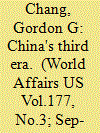

|
|
|
|
|
| Publication |
2014.
|
| Summary/Abstract |
The history of the People's Republic, according to the dominant narrative, falls into two broad sections: the turbulent decades dominated by Mao Zedong, the founder of "New China," and the time of "reform and opening up" started by his successor, Deng Xiaoping. Now, however, the Chinese state has passed important political and economic inflection points. As a result, the third era of the People's Republic-an era of crisis and instability-has already begun.
|
|
|
|
|
|
|
|
|
|
|
|
|
|
|
|
| 13 |
ID:
137194
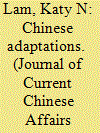

|
|
|
|
|
| Summary/Abstract |
Chinese migrant entrepreneurs in Ghana perceive themselves as vulnerable, as regularly they encounter problems and their businesses fail. The adaption experiences of Chinese entrepreneurs in Africa, especially non-traders, remain largely unstudied. By looking at the interactions of newly arrived and established Chinese migrants with institutional actors, partners, local employees and other Chinese in Ghana, this paper shows the multiple dimensions of how Chinese entrepreneurs’ migration adaptation evolves, and how they create social capital to develop their businesses in Ghana. From the Chinese perspective, established entrepreneurs condemn the recent numerous “new” Chinese in Ghana as part of the root cause of problems, on account of their “poor quality and bad behaviour”; by comparison, the newly arrived Chinese attribute their challenges to deficiencies in the local people and institutions of the host country. The negative experiences of Chinese entrepreneurs in Ghana provide further evidence for, not only African, but also local Chinese agency from below, and suggest that the rising Chinese presence does not necessarily improve the social status of Chinese entrepreneurs or create a stronger, more unified Chinese community on the continent.
|
|
|
|
|
|
|
|
|
|
|
|
|
|
|
|
| 14 |
ID:
132408
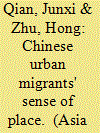

|
|
|
|
|
| Publication |
2014.
|
| Summary/Abstract |
In this paper, we study urban migrants' sense of place in Guangzhou, China, focusing on the structural relations between place attachment, identification and dependence as the three key place dimensions. Through both quantitative structural equation modelling and qualitative analysis of in-depth interviews data, our research suggests that migrants' sense of place demonstrates complex relationships between the three registers of emotional attachment, identity formation and functional dependence. The construction of sense of place is also related to the personal experiences of living as urban 'outsiders'. Our research also reveals a striking difference between the city and community levels in terms of the ways in which migrants' sense of place is constructed. Urban migrants tend to exploit the functional utilities of microscopic urban spaces to meet their demands for recreation, education and socialisation. On the other hand, their sense of place to the city is largely compromised by their attachment to the hometown and conditioned by their personal identification to the city.
|
|
|
|
|
|
|
|
|
|
|
|
|
|
|
|
| 15 |
ID:
127846


|
|
|
|
|
| Publication |
2013.
|
| Summary/Abstract |
William James Booth elaborates three main challenges to my social lineage account (Patten 2011). Conceptually, he finds the proposal to be question-beginning. Normatively, he thinks that it has objectionable implications. And, substantively, he claims that the proposal is unhelpful, in that it fails to explain a case of theoretical importance for multiculturalism. In this reply, I argue that each of these challenges misses the target. The social lineage account continues to offer a promising, nonessentialist basis for normative multiculturalism.
|
|
|
|
|
|
|
|
|
|
|
|
|
|
|
|
| 16 |
ID:
132231
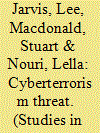

|
|
|
|
|
| Publication |
2014.
|
| Summary/Abstract |
This article reports on a recent research project exploring academic perspectives on the threat posed by cyberterrorism. The project employed a survey method, which returned 118 responses from researchers working across 24 different countries. The article begins with a brief review of existing literature on this topic, distinguishing between those concerned by an imminent threat of cyberterrorism, and other, more skeptical, views. Following a discussion on method, the article's analysis section then details findings from three research questions: (1) Does cyberterrorism constitute a significant threat? If so, against whom or what?; (2) Has a cyberterrorism attack ever taken place?; and (3) What are the most effective countermeasures against cyberterrorism? Are there significant differences to more traditional forms of anti- or counterterrorism? The article concludes by reflecting on areas of continuity and discontinuity between academic debate on cyberterrorism and on terrorism more broadly.
|
|
|
|
|
|
|
|
|
|
|
|
|
|
|
|
| 17 |
ID:
124944
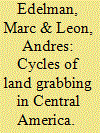

|
|
|
|
|
| Publication |
2013.
|
| Summary/Abstract |
The lack of historical perspective in many studies of land grabbing leads researchers to ignore or underestimate the extent to which pre-existing social relations shape rural spaces in which contemporary land deals occur. Bringing history back in to land grabbing research is essential for understanding antecedents, establishing baselines to measure impacts and restoring the agency of contending agrarian social classes. In Central America each of several cycles of land grabbing-liberal reforms, banana concessions and agrarian counter-reform-has profoundly shaped the period that succeeded it. In the Bajo Aguán region of Honduras-a centre of agrarian reform and then counter-reform-violent conflicts over land have been materially shaped by both peasant, landowner and state repertoires of contention and repression, as well as by peasants' memories of dispossession.
|
|
|
|
|
|
|
|
|
|
|
|
|
|
|
|
| 18 |
ID:
128527
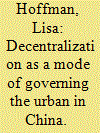

|
|
|
|
|
| Publication |
2013.
|
| Summary/Abstract |
This paper considers what a Foucauldian-informed analysis of decentralization and urban transformation offers to current debates. It analyzes decentralization as a new regime of governing, in contrast to many studies that treat it as a policy process, objective or outcome aimed at alleviating some problem of centralized authority. Rather than understanding decentralization as less state governance, this paper asks how practices such as local autonomy are in fact technologies of governing the urban. Decentralization is analyzed then not simply as an absence of some central state power, either in the political or fiscal realm, but rather, as new mechanisms of governing the urban, which are linked with the regulation and constitution of subjects. The paper focuses on an aspect of decentralization that typically is under-examined: the decentralization of welfare provisioning in urban China. Under high socialism of the Maoist era, social services for urban residents were distributed by the state, through the work unit (danwei) as part of the planned economy. In recent years, however, major reforms have been put into place to diversify the ways in which social services are delivered, under a general rubric of decentralizing the distribution away from the state. Based on anthropological research in Dalian, a major port city in northeast China, this paper examines a new social practice and subject form that has emerged with new ways of caring for those in need in the city: volunteerism. By focusing on this resulting social form, the paper argues that we may better understand how decentralization is not a singular process with multiple outcomes, but rather, a complex assemblage of elements that includes technical questions about how to govern as well as normative practices of subject formation. An analytical disaggregation of these elements also allows us to avoid the assumption that decentralization necessarily contains certain characteristics, or that it will lead to particular kinds of political and social forms.
|
|
|
|
|
|
|
|
|
|
|
|
|
|
|
|
| 19 |
ID:
129424
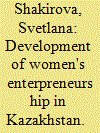

|
|
|
|
|
| Publication |
2014.
|
| Summary/Abstract |
The level of development of women's entrepreneurship is an eloquent indicator of the level of business development in Kazakhstan. Currently, women's contribution to GDP in Kazakhstan is 40 percent and the share of SMEs run by women is 41 percent. According to the Statistics Agency of Kazakhstan , the proportion of small and medium business in the country's GDP is 17.8 percent. It is expected that by 2020.
|
|
|
|
|
|
|
|
|
|
|
|
|
|
|
|
| 20 |
ID:
129243
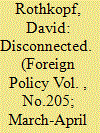

|
|
|
|
|
| Publication |
2014.
|
| Summary/Abstract |
The fabric of civilization is being rewoven around us. The very nature of life, work, and society is changing so profoundly that we are approaching a moment at which our old ways of thinking about the structures that sustain us may be seen as obsolete. This happens periodically throughout history -- think of the Renaissance, the Reformation, the Enlightenment, and the Industrial Revolution. Such eras often produce turmoil or upheaval, until leaders emerge who are able to help shape a new order for a new age.
The question today is whether our leaders are up to the challenge. Given their lack of grounding in the world's most pressing scientific and technological issues, I fear many, if not most, are not. Formerly disenfranchised populations are increasingly connecting to telecom, Internet, and other services. For instance, mobile-phone penetration was estimated to have surpassed 80 percent in Africa in the first quarter of 2013, according to figures published in 2012 by ABI Research. What's more, it is growing faster in Africa than anywhere else in the world. And though smartphone penetration in Africa is just 20 percent -- pretty near global levels -- it is expected to explode in the next few years.
|
|
|
|
|
|
|
|
|
|
|
|
|
|
|
|
|
|
|
|
|